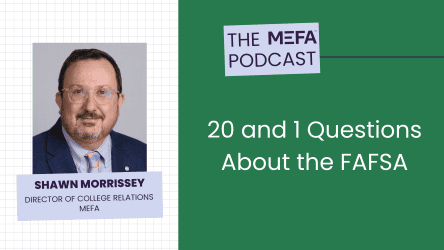Resources Mentioned in this Episode
Jonathan Hughes: [00:00:00] Hello everyone and welcome to the MEFA Podcast, my name is Jonathan Hughes.
Julie Shields-Rutyna: And I’m Julie Shields-Rutyna.
Jonathan Hughes: Julie, this is our last show of 2024 and we are here to talk about the FAFSA because the FAFSA is out, right? It’s been out.
Julie Shields-Rutyna: It is. It is out. It is launched. It was promised that it would be available on December 1st, and it even came out a little bit earlier than that.
Jonathan Hughes: Yeah, so we’re recording this in mid December, so the form has been out for what, about three weeks or so? Three or four weeks by now? And so whenever the FAFSA debuts, of course, the form and all of its changes meets reality, we get lots of questions from parents and students on how to file. And to help answer those questions, we have our in house [00:01:00] FAFSA expert returning to the show, MEFA’s Director of College Relations, Shawn Morrissey.
He’s going to be joining us in just a minute or two. But first, Julie, can you tell folks who are planning to file, how can MEFA assist them in filing the FAFSA.
Julie Shields-Rutyna: Sure thing. So MEFA is always available to answer any questions you may have on the FAFSA. You can email us at collegeplanning@mefa. Org or call us at 1 800 449 MEFA or you can even request a one on one appointment with us to talk through all of your questions. During FAFSA season, MEFA is also hosting some virtual events called FAFSA Festivals, and you can join virtually and be paired up with an expert, and professionals from all over Massachusetts, from financial aid offices, from MEFA, from some other organizations, can sit with you and walk through the FAFSA online.
So that you can complete it right there. So we’ve had a few of those already [00:02:00] and you can find a full listing as well as a place to RSVP at MEFA.Org. And then we’re also taking part in another Massachusetts group called FAFSA day. And that functions in a similar way where you join an event and you’re paired with an expert and you can get help.
So we will put the links in the show notes for those events. And finally, we’re hosting and recording webinars on Financial Aid 101 and understanding the FAFSA. So you can just learn more about the form and the role it plays in receiving financial aid. You can attend one of those or you can view the recordings on MEFA.Org.
Jonathan Hughes: And so we did, as you mentioned, we did have that Understanding the FAFSA webinar that we did, I think, last week, and we had a few hundred folks attend that presentation, and that really formed the basis of this week’s episode, because what I thought we could do with Sean is take the top 20 questions that we received from [00:03:00] attendees from that webinar, And ask him those questions.
Now, what makes these the top 20 questions you ask? Me, I arbitrarily decided what I thought were the top 20 questions. We had about a hundred questions come in. Some of these are questions that I think a lot of folks have and, are illustrative of questions that are like popular questions.
Some of them are not, some of them are niche questions that I think are interesting and may illustrate something important. About the financial aid process. So we don’t want this to be like a three hour show So this is a lightning round format and even though he’s been ill recently and still fighting it He assures me he’s in shape to do a lightning round here.
So let’s welcome to the show to answer these questions Welcome back. MEFA’s Director of College Relations, Shawn Morrissey. Welcome to the show, Shawn.
Shawn Morrissey: Thank you, Jonathan. Happy to be here.
Jonathan Hughes: This is a question that I have received, actually, so I think this is something. The very few questions that I’ve got so far about the FAFSA this year, this is one of them.
It’s, my daughter filled out her FAFSA form last [00:04:00] week. She sent, she invited me to participate. But I still haven’t received her invite in my email. What should they, what should that person do, Shawn?
Shawn Morrissey: There are a couple of things that they want to make sure that they do. One is to check their spam folder. It may have gone to the spam folder. The other thing is to make sure that the information on the invitation matches the invitation that the parent put in their FSA ID. When they set that up on student aid.gov if that information doesn’t match, sometimes they can’t connect the parent and the student information, and the student can go back in and correct that information to match what’s on the parent’s FSA ID, and that usually clears up the problem.
They can also try logging to student aid.gov to see if that invitation is available. To them on their dashboard on studentaid.gov because even if they don’t have not received the email, if they have that invitation attached when they log in on studentaid.gov, [00:05:00] they can access the FAFSA and complete their section.
Jonathan Hughes: Just a little follow up, a quick follow up, how long should it take to get that email once the student has completed their section and invited the parent?
Shawn Morrissey: It’s usually pretty instantaneous, so depending on your email server, it takes a few minutes, usually.
Julie Shields-Rutyna: Alright, so I have one, Shawn. My student’s FAFSA was submitted and processed on November 21st, but I’m having trouble figuring out if the schools have actually received it.
Some school web portals show it is received. Some specifically say it is not received. And some have no indication on their web portals of whether it’s received or not. In the meantime, my student is getting reminder emails from some of these schools to fill the FAFSA. And I can’t tell if that is just a generic email or specific email.
To my student. What’s the process? The best way to go about confirming that the [00:06:00] students have received the colleges have received the FAFSA.
Shawn Morrissey: Of course. So as soon as your FAFSA is processed, the information of that within a couple of days is sent to every school on that you’ve listed on your FAFSA.
However, not every school right now has their financial aid system. Up and ready to receive FAFSAs. For some, their portals may not be indicating that they’ve received their FAFSA yet, but they may just not have the capacity to do that yet. And so you may, just be receiving reminders based on that.
The best thing to do is to keep checking those portals. If you end up in the situation where there is one school that hasn’t received your fax of all the other schools have you can contact that school to see if there are any issues to make sure that they know that you have filled out the FAFSA and make sure that they didn’t miss that somehow.
But it may be just the case that they’re not receiving any [00:07:00] FAFSAs yet because their system may not be ready. Schools are different ready at different times to receive those FAFSAs and they just remain in a holding box until they can receive them all once their system is ready.
Jonathan Hughes: All right question number three.
If you already, I’m sorry, If I already have an FSA ID from my own college loans, will I need a new FSA ID when contributing info for my child’s financial aid application?
Shawn Morrissey: No, you can actually only have one FSA ID. Each FSA ID is tied to one individual. So you would only have one FSA ID. However, each student needs their own FSA ID.
And each parent that’s contributing that has to contribute would need their own FSA ID. But each person only has one FSA ID.
Julie Shields-Rutyna: And another one. These, yeah, these are great. My kids sent the invite link to both of us parents. We’re married and we file. income taxes [00:08:00] jointly. Can the primary parent then open the invite link and fill in the details or do both parents need to open the invite links and provide the information?
Shawn Morrissey: Yeah, so there are cases where the student would send the invitation to two parents to both of their parents, but if the parents do file joint tax returns, only one of those parents actually has to respond to the invitation. When you’re filing jointly, Both parents have equal access to that information and either one of them can fill out the FAFSA.
So once one of them fills out the parent portion using their FSA ID, the other parent invitation just goes away. There’s no need to respond to that. And it doesn’t matter which parent does that in that case. If the parents are married and filing jointly, just one of them needs to do that.
Jonathan Hughes: On to the next one.
My student used a school email address as a login. Can he [00:09:00] go in and change that at some point?
Shawn Morrissey: Yeah, so if you used an email address like a school email address that you may only have access to for a limited period of time, we recommend that you do go in and change that to an email that you can use at any time.
And you just go back into studentaid.gov you Log in. Look at your profile and you’re able to edit that in there and you can change your email address. You’ll just need to go back in. When you do that editing of your email address, it will send an email to that new email address. You’ll need to confirm that.
And once you’ve confirmed that, then it will be set to use the new email address going forward.
Julie Shields-Rutyna: All right. Here’s a good one. Does it matter? If the student or parent starts the, their portion of the FAFSA form first,
Shawn Morrissey: it doesn’t matter. There are two routes to start the FAFSA. Either the student can start that and then invite the parent or the parent can start it as the student.
and then go through the whole [00:10:00] process. It’s been recommended that it’s easier and the flow works a little better if the student starts that and then invites the parent. There’s a little bit of duplicative information that gets filled in if the parent starts it as the student and then goes through the process.
But either way, you can get a valid FAFSA finished.
Jonathan Hughes: All right. Next one, is all retirement income such as pension, social security, 401k withdrawal considered income?
Shawn Morrissey: So on the FAFSA, any taxable income that appears on the tax return is considered income for the FAFSA. And in most cases, all of that information is being pulled directly from the IRS onto the tax return now through the FADDX process.
So that’s automatically coming in there. Big thing to know that if you did have a rollover, You want to make sure that you do indicate that on the FAFSA because that’s going to show [00:11:00] on there but not necessarily indicate as a rollover, and most of the time if it’s a rollover, that’s not considered taxable income, so you want to make sure that’s noted on the FAFSA, and they do give you an opportunity to do that in a follow up question to the tax information Retirement income is listed on the FAFSA if it’s taxable.
Retirement savings is not included on the FAFSA, just as a clarification.
Julie Shields-Rutyna: Can I use my same FSA ID that I used last year for student number one? Or do I need a new FSA ID for student number two?
Shawn Morrissey: Again, you would use the same, you only can have one FSA ID. So as the parent, you would always use the same FSA ID for the parent information on all students.
Each student will need their own FSA ID. So student one and student two will both need their own FSA ID, but the parent would use the same FSA [00:12:00] ID for their information.
Jonathan Hughes: If my spouse passed away in 2023 and I filed marrying married filing jointly, do I just subtract my spouse’s wages from his W-2 to determine the adjusted gross income?
Shawn Morrissey: Yes. Sorry that about the situation what may happen if you are able. To provide manual information on of your taxes on the FAFSA that is A skip logic kind of thing and sometimes if it shows that you’re widowed and you were married filing jointly It will present you with the opportunity to manually enter your taxes.
Sometimes it may not But in those cases and in all cases you should let the school know about your situation. . So they can tell you exactly what information to provide so that they can use that properly.
Julie Shields-Rutyna: And then how do you indicate if your financial situation or your income has changed drastically since [00:13:00] your last tax filing?
Let’s say you had a job loss or something like that.
Shawn Morrissey: Yes, again, that’s a situation where you should definitely reach out to the financial aid office at each of the schools that you’re applying to and let them know what the situation is that there has been a loss of income, a job loss, and they will let you know what documentation they need and how they can change that information for you to use more current information to determine your financial aid.
Jonathan Hughes: Just to clarify, if the parent and student created their FSA IDs a few months ago, the parent cannot just go in and start filling out their section of the FAFSA application until the student has invited them. Is that correct? So for review.
Shawn Morrissey: So there, again, there, there are two ways that you can begin the FAFSA.
You can begin that as the student and then invite the parent and then the parent goes in and fills out their [00:14:00] section or the parent can go in and say they’re beginning the FAFSA as a parent and start with the student information on there. There really is no path for the parent to just go in and say, I want to fill out the parent section and then have that go in later.
The only way that ever works is if the parent had filled out. The parent section for another sibling, then as soon as they get the new invitation and accept that invitation, their information is pulled in right to that second student as well. But a parent can’t just go in and fill out a parent section on their own, but they can begin a FAFSA for a student saying that they are a parent.
And start with the student section on there.
Julie Shields-Rutyna: Can you send the FAFSA to colleges that you haven’t applied to yet?
Shawn Morrissey: Yes, you can indicate that you want the FAFSA information sent to any schools that you plan on applying to. You don’t have to have had applied through admissions before you fill out the [00:15:00] FAFSA. And in many cases you want to make sure that FAFSA isn’t on time. You may be sending in FAFSA information before. We might send in admissions information. So that’s perfectly acceptable.
Jonathan Hughes: Is the FAFSA used at all in applying to colleges outside of the U. S.?
Shawn Morrissey: So in some cases if there is a college outside of the U. S. that does process U. S. federal financial aid, Title IV aid, then You would have to fill out the FAFSA. There’s a list of colleges that do process Title IV federal aid on The federal website on studentaid.gov and we’ll provide a link to that in the show notes that shows all those colleges, but you can always Check the school’s website as well to see if they participate in that and do require the FAFSA.
In most cases a lot of federal, foreign schools would not be using the FAFSA because they don’t participate in U. S. federal programs, but there are some [00:16:00] that do.
Julie Shields-Rutyna: So my daughter incorrectly reported the 529 account in the student section, but now I realize she’s the beneficiary, not the owner, and it should be in the parent section. Is there a way to make that correction? Once the form has been submitted.
Shawn Morrissey: Yes, on that kind of data item or any of the data items. If you find that you make a mistake once the FAFSA is processed and you receive your summary from studentaid.gov, you can go back in and make corrections. So you just log back into studentaid.gov and you’re given the opportunity to correct any of the information that you did enter at that time. And so you can just go back in and zero that out in the student section and add that into the parent asset section.
Jonathan Hughes: My family size is being reported as zero. I don’t see where it can be changed.
Should it be changed on the parent or student application? So what happened there and how do they fix that?
Shawn Morrissey: So I’m not sure exactly what happened there. So what [00:17:00] happens with family size is it’s pulled from the tax data. It’s pulled automatically from the federal tax information as to how many people there are in the family on the taxes.
You do have the opportunity to override that and put that information on the FAFSA so you can go in and correct that data. And just put in the correct family size if that doesn’t match what was pulled from The federal tax information.
Julie Shields-Rutyna: All right. My parents live with me and I take care of all of their bills. Do I count them as dependents?
Shawn Morrissey: So I’m assuming that means the grandparents of the student and this is the parent asking the question.
Julie Shields-Rutyna: Oh, I’m –
Jonathan Hughes: I’m assuming that as well. But yeah.
Julie Shields-Rutyna: Yes. Okay. That makes sense. So my parents live with me. And I take care of all of their bills. Do I count them as dependents as well?
Shawn Morrissey: Yes. If you are providing more than 50 percent of the support for someone living in your household, [00:18:00] you can include them on, in your family size for federal student aid purposes. So as long as you’re providing more than 50 percent of the support, which it sounds like that is the case in this situation, then you can include those in the family size.
Jonathan Hughes: Alright, getting close to being done. If my student is not considered independent, how are his parents supposed to file the FAFSA if they don’t have a social security number? What do you suggest in this case?
Shawn Morrissey: So if you don’t have a social security number, you can still create an FSA ID and complete the FAFSA.
So there is a whole process for creating an FSA ID without a social security number. So first of all, you are presented with the option of answering questions from a credit report. And if you answer those correctly, it will verify your identity. And you’re able to go right away and fill out the FAFSA using that new [00:19:00] FSA ID.
If you’re not able to answer those questions, you can still fill out the FAFSA using that FSA ID that you’ve just created. And then you may have some follow up information with the schools. That you are applying to then verify your identity, but you do not need a social security number to be a contributor on a FAFSA.
Jonathan Hughes: If there’s no SSN and there’s a section for the SS, there’s a part in the FAFSA where you have to put in your SSN, is it all nines?
Shawn Morrissey: No, there’s just a box that you check that says, I do not have a social security number. Oh, okay. So then they made it much clearer now that you don’t have to do any of these follow ups or have any special knowledge if you don’t have a social security number.
There’s a clear box that just says, I do not have a social security number and they bring you through another process on there.
Julie Shields-Rutyna: Great. And then, can parents see the FAFSA submission summary, FSS, on their account? Or just the student.
Shawn Morrissey: Only the student has access to the FSS the [00:20:00] FAFSA submission summary. Parents will be able to see that they’ve completed their section, but they’re not going to be able to see the Fs s The student will have to log in on student aid.gov with their own FSA ID in order to see the f. S.
Jonathan Hughes: Alright, question number 19 here, my last question. Kiddo, legally changed name, but does not have a new social security card yet.
Should he start the FAFSA with the previous name, the one on the social security card, and then edit the profile once the new card is issued, or wait to start, it says, or wait to start profile? Once the new SS card is issued, so I’m not sure she means CSS profile or what, but it was somebody who is mid name change did What’s the advice there for filing the FAFSA?
Shawn Morrissey: They should really check with the social security administration to see What name they have on file right now because what’s going [00:21:00] to happen when you create an FSA ID is it does? Go out to the Social Security Administration and match their records. So if they’ve begun the process with the Social Security Administration but just haven’t received a physical card yet, then it may be the case that the Social Security Administration’s records have the new name already in their system but haven’t generated a card yet.
So you should check with the Social Security Administration to see what’s happened. If you know that you haven’t actually even gone to the Social Security Administration and Initiated that change yet, then you would use the old name because you know that change has not been made with the Social Security Administration and then once the name is officially changed with the Social Security Administration, you would go back in and update that information on the studentaid.gov profile to match the new information.
Jonathan Hughes: Because they have to match.
Shawn Morrissey: They have to match. Correct.
Jonathan Hughes: All right, Julie, number 20.
Julie Shields-Rutyna: All right, number 20. Should the asset amount [00:22:00] reported on the FAFSA match the asset amount reported on the CSS profile? Due to the timing of submission, I’m concerned it may not.
Shawn Morrissey: Yes, so both of those questions are asking your assets as of that day.
So it’s the day that you’re filing. So if you’re filing on different dates, that could very well be different amounts. So it’s going to depend on the timing of when you’re filling those out. If you’re filling them on the same day, they absolutely should match. If you’re filling them out a month apart, they may not match.
So you’re, it’s based on what your asset holdings are as of that day.
Jonathan Hughes: All right, Shambhala. I know I said 20 questions. I’ve got one extra one now. FAFSA, we’re a year out from the sort of FAFSA. I don’t know what to call it. I don’t know what we’re supposed to call it. But for whatever happened last year with the FAFSA, we’re in year number two after simplification.
There was a lot of frayed nerves from last year. Nobody was sure what to expect this year. What are your impressions so far on [00:23:00] how it’s been going?
Shawn Morrissey: It’s a very different year this year, Jonathan. It’s been very positive so far. They did a lot of testing before the FAFSA went live. From what we’re hearing from families, they don’t have the difficulties that they were having last year.
Schools are receiving the fastest right away on their regular schedule. Unlike last year, where it was delayed for months and months before schools could get the information. Families are able to make corrections right away. The whole process. Is working this year. So there are, some still some minor processing tweaks that they have to make the process where they really envision it to be for everyone to have a really great and easy experience, but for the great majority, that seems to be the case this year where it really wasn’t last year.
Jonathan Hughes: All right Shawn. Thank you so much for being here. We really appreciated it.
Shawn Morrissey: Oh, I was happy to be here, Jonathan, anytime.
Jonathan Hughes: Thank you very much, Julie. Thank you. [00:24:00] And as always, if you liked what you heard today and you want to hear more from us on planning, saving and paying for college and career readiness, then please follow the show and you can find us wherever you find your podcasts. And please remember to rate and review us.
I would like to thank our producer Shaun Connolly, I would like to thank AJ Yee, Lisa Rooney, Lauren Danz, and Meredith Clement for their assistance in getting the show posted. Once again, my name is Jonathan Hughes and this has been the MEFA Podcast. Happy New Year everyone!










